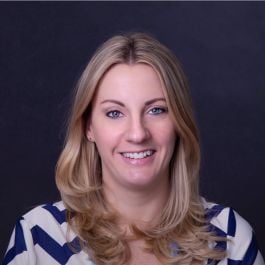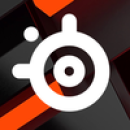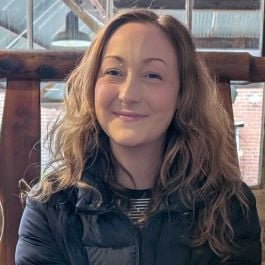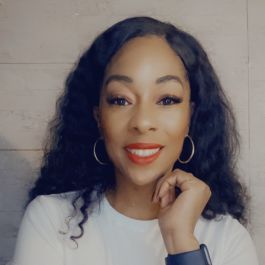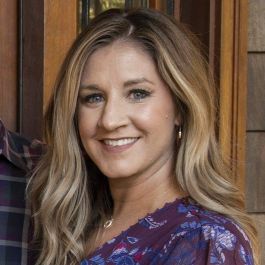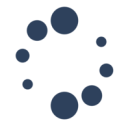There is no one path to landing a job in customer success.
Among the nine customer success professionals we spoke with, many had nontraditional work backgrounds that included bartending, teaching, pharmaceutical research, advertising, and more.
What we learned? For customer service, that kind of variety in skills is ideal.
That’s because customer success requires a unique blend of hard and soft skills — data analysis, problem-solving, and emotional intelligence are all crucial to being successful in the field.
Read on to learn how the following customer success professionals landed their roles — and the skills they continue to find most useful in it.
Tech Companies with Great Customer Success Teams
Osano is an all-in-one data privacy platform that helps organizations build, manage and scale their privacy programs.
Tell us about your journey into customer success. What kinds of roles were you in before customer success? What made customer success the right choice for your career?
I started out as a ski bum with a fisheries biology degree — bartending at night to fuel my days on the slopes. That experience taught me how to think on my feet, connect with people from all walks of life, de-escalate tough situations and juggle competing priorities — all surprisingly relevant to customer success. My first 9-to-5 role was in account management at a SaaS startup in the automotive industry where I focused on building long-term relationships. That’s where I realized how much I enjoyed being a trusted partner to clients. Earlier on, I was a sailing instructor and sports coach, which sparked my passion for helping people grow and reach their goals. This drive to be supportive and solutions-oriented is what makes customer success such a natural fit and a rewarding career for me.
What skills, proficiencies or background experience have you found to be most useful for your career in customer success? Has anything surprised you?
Bartending has had a huge impact on my career in customer success. That’s where I learned to communicate clearly, connect quickly and most importantly, listen actively. Whether someone walked in happy, stressed or just needing to talk, my job was to tune in, ask questions and build rapport. The ability to be present, listen with intention and connect meaningfully translates directly into customer success. When I meet a customer for the first time, they don’t know me, and I don’t know them. It’s on me to earn their trust and make the relationship feel like more than a transaction. That early experience taught me that people engagement skills aren’t just useful — they’re foundational. Honestly, I never expected that a job I took to get by would shape my career and help me build a life I’m proud of. That’s been the best surprise.
If you could give any advice to professionals looking to make the move to customer success, what advice would you give them?
If you’re thinking about moving into customer success — first off, great choice. Yes, the market is competitive and hiring managers often look for experience driving NDR (net dollar retention), GDR (gross dollar retention), expansions and so on. To take a step back: the heart of customer success is helping people succeed. Ask yourself: Have you practiced empathy, listened closely and helped someone reach a goal? If you can clearly communicate that and tie it to real outcomes, you’re already on the right path. If you’re not there yet, start developing those skills. Sales tactics and product knowledge can be taught. But building trust and human connection — that’s foundational. At its core, customer success is a human-to-human role.
Elevate K-12 is an edtech company that brings equity in education to all students and teachers, irrespective of ZIP code. Elevate K-12 uses hiring practices that promote diversity.
Tell us about your journey into customer success. What kinds of roles were you in before customer success? What made customer success the right choice for your career?
My path to customer success wasn’t linear, but it was always rooted in client services and strategic problem-solving. Before transitioning to customer success at Elevate K-12, I held roles mainly in sales and account management as well as consulting in the K-12 test prep industry. In those roles I was responsible for building relationships, identifying client needs and helping them achieve their goals. Over time, I realized that what I enjoyed most was the intersection of relationship building and driving long-term impact, which is the heart of CS. The move felt like a natural evolution, allowing me to stay close to the customer while taking a more proactive and strategic role in their journey.
What skills, proficiencies or background experience have you found to be most useful for your career in customer success? Has anything surprised you?
Strong communication skills, empathy and the ability to manage cross-functional projects have all been essential. My background in consulting and account management gave me a solid foundation in client engagement and critical thinking, but what has surprised me the most is how important adaptability and data fluency have become. In today’s landscape, customer success is just as much about understanding usage data and product insights as it is about human connection. Being able to translate data into meaningful action for both the customer and internal teams has been a key differentiator in my work.
If you could give any advice to professionals looking to make the move to customer success, what advice would you give them?
Start by getting close to the customer, no matter what role you’re in. Listen to their pain points, understand what success looks like to them and think critically about how your product or service helps achieve their goals. Customer success requires a mix of empathy, curiosity and business acumen so look for opportunities to sharpen each of those skills. Also, don’t underestimate the value of storytelling. Being able to advocate for your customers internally while aligning their goals with your company’s objectives is a powerful skill. Finally, remember that success in this field comes from a genuine desire to help others succeed.
SteelSeries is a global leader in hardware and software for gaming.
Tell us about your journey into customer success. What kinds of roles were you in before customer success? What made customer success the right choice for your career?
Customer success has many different definitions depending on the company. It can support account managers or become the definition of the entire customer experience.
Prior to customer success I was in real estate tech; started out as customer experience and evolved into a full success solution.
Going way back I spent many years in hospitality and ran my own small business.
I have become obsessed with the customer effort and journey. ‘Obsessed’ is not even a strong enough word. Early in my career, an old study showed that a majority of people who have an issue and get it resolved with over-and-beyond support become loyal. So, I wanted to be “the fixer.” Over time this led me to learn the skills needed to think quickly and make decisions. Often we work with our customers to help them adopt features OR resolve a single issue. THEN it’s the point of creating long-term solutions. As we all know — band-aids don’t last forever!
What skills, proficiencies or background experience have you found to be most useful for your career in customer success? Has anything surprised you?
Customer experience and hospitality roles typically provide awesome skills when it comes to pursuing a career in customer success. You learn empathy, patience and to quickly identify what a customer’s expectation is.
Generally, in customer success you get the opportunity to work with multiple teams. So being able to be a mediator and solution finder in between multiple teams with every different role can be huge. Engineers, salespeople and customer experience; be in the middle of them all. Many people don’t often expect that, so when you see a job listing and it says “cross-team communication is necessary” — I believe roles in customer success define this in every way!
If you could give any advice to professionals looking to make the move to customer success, what advice would you give them?
Empathy: not only with customers but with other teams you are involved with.
Listen: understand the customer’s goal and expectations. Apologize for certain scenarios immediately.
Build product knowledge: External and internal knowledge base is crucial. Part of customer success is ensuring the customer adopts all things relating to the product or service.
Adapt and be open to learning: Continuous learning of new tools, methods and tech is huge. There are 10 answers to every issue and 10 different ways to maintain a relationship. Stay flexible in industry learnings!
Prioritize customer outcomes: All customers aren’t the same, so focus on what each individual customer’s expectation of the outcome is. Get them there, and make sure they know it! Thank them!
AcuityMD’s intelligence platform is designed to help medical technology companies identify target markets, surface top opportunities and grow their businesses.
Tell us about your journey into customer success. What kinds of roles were you in before customer success? What made customer success the right choice for your career?
My journey to customer success was not very linear at all (as very few careers are). I graduated from university with cellular biology and statistics degrees. I found myself working at a few biotech companies supporting clinical testing and drug manufacturing research. It was amazing seeing firsthand how drugs are produced and life-changing diagnostic testing is conducted.
However, these roles lacked human connection when I spent all my time in the lab. I made a significant career switch to join a SaaS company that builds tools for life science researchers. I joined as an early member of the CX team where I did everything from support and implementation to long-term CS. After a few years, I transitioned to focus solely on customer success, where I had the pleasure of leading several different teams across various health tech verticals.
CS has been truly a perfect fit for me. I love establishing relationships with end users and decision-makers. I feel connected to their goals as my own, and I love getting creative to drive stickiness and value for them. It’s the one role I’ve found that offers the most authentic connection with customers.
What skills, proficiencies or background experience have you found to be most useful for your career in customer success? Has anything surprised you?
As someone who has led teams across different CS organizations, I’ve seen a wide variety of skills and backgrounds that lead to successful careers. I want someone who’s breaking into CS to know that there isn’t a one-size-fits-most persona. However, I do find that there are three commonalities among the top performers I’ve partnered with.
3 Commonalities Among Top Customer Success Performers
- Genuine curiosity — a CSM who displays real curiosity to get to know a customer's business will develop the best relationships and understand the true root causes of issues.
- Proactiveness — a proactive CSM always has their eye on what's coming and what could go wrong. Strong CSMs should have a plan A, B and C and be ready to jump into customer issues before they become impossible to solve.
- Ruthless prioritization and flexibility — being able to organize yourself, make quick decisions to de-prioritize low-value items and keep multiple discussions in your head at once are all key skills.
If you could give any advice to professionals looking to make the move to customer success, what advice would you give them?
Jumping into CS for the first time can actually be more challenging than people make it out to be. Many professionals view CSMs as merely an extension of customer support or onboarding teams. The truth is that strong CS teams focus much less on tactical customer support and much more on the strategic goals a customer has for your products.
My advice to professionals looking to break into CS would be to consider how you’ve solved customer issues and identify the true business outcomes of those solutions. Be prepared to tell that story both internally and externally. If you’re unsure of the business impact, think about the questions you’d want to ask the customer before, during and after solving their issue. Too often I see CSMs excitedly showcasing newly released features without connecting them to the customer’s goals. A first-time CSM should focus on asking discovery questions that reveal a customer’s objectives. Once you understand those goals, everything else becomes easier.
DISQO is an audience insights platform where members share information that improves human experience.
Tell us about your journey into customer success. What kinds of roles were you in before customer success? What made customer success the right choice for your career?
My journey into customer success began at a performance advertising agency in Philadelphia, where I oversaw operations for the customer analytics delivery team. That role introduced me to the client-facing side of analytics, and I quickly realized how much I enjoyed partnering directly with clients to solve complex challenges.
Before that, I worked in sales analytics at a consulting firm, focused more internally. Moving into customer success allowed me to apply my analytical skills in a more dynamic, relationship-driven setting.
Since then, my career has followed a client-focused path — supporting attribution solutions at Yelp, managing global campaign measurement for clients like Google and Diageo at PHD Media, and now partnering on strategic insights at DISQO.
Customer success combines two of my core strengths: problem-solving and relationship-building. I find it fulfilling to bring clarity to challenges, help clients realize their vision, and uncover insights that deepen their understanding. I genuinely enjoy turning complexity into collaborative conversations and becoming a trusted strategic partner.
What skills, proficiencies or background experience have you found to be most useful for your career in customer success? Has anything surprised you?
Some of the most valuable skills I’ve developed in customer success include adaptability, forward-thinking, a commitment to deep understanding, and a proactive mindset. I’ve found that the best outcomes often come from clear, focused conversations paired with thoughtful use of existing tools and solutions to meet customer needs, sometimes even before they know exactly what those needs are.
One piece of advice that really stuck with me came from a former boss, who said: “If you can start to anticipate and then accurately act on what you think your clients are anticipating, you will have less bad days at work.” That perspective has shaped how I approach client partnerships — it’s not just about being responsive, but about staying ahead of the curve.
Surprisingly (or maybe not!), math has played a bigger role than I expected. I still remember the first time I used slope in a real-world context and thought, “Wow, 8th-grade Algebra really came through.” Even if my memory wasn’t perfect, the principles were there, and they’ve helped me make meaningful connections between data and strategy for my clients.
If you could give any advice to professionals looking to make the move to customer success, what advice would you give them?
Be ready to listen deeply, think ahead, and take ownership, especially when clients aren’t quite sure what they need yet. Customer success isn’t just about supporting a product or service; it’s about translating ambiguity into action and becoming a partner clients trust to help them reach their goals.
It also helps to bring a structured mindset. You don’t need to be a data scientist, but being comfortable with numbers — knowing how to interpret trends and asking the right questions — can go a long way in delivering insights that stick.
Finally, don’t underestimate the power of clear, confident communication. Some of the most impactful work I’ve done has come from creating space for transparent dialogue and guiding clients toward outcomes they didn’t even realize were possible.
Bestow builds technology to modernize the life insurance industry and make things easier on everyone from consumers to carriers.
Tell us about your journey into customer success. What kinds of roles were you in before customer success? What made customer success the right choice for your career?
Before joining Bestow to lead the customer experience team, I dedicated 23 years to the financial services industry, most of it was spent overseeing insurance operations. In that capacity, my team supported financial advisors in securing client protection, with all interactions being business-to-business (advisor and carrier-focused), not directly with end clients. Despite not having directly managed a customer-facing team before, I felt my deep experience in life insurance, operational understanding and passion for continuous improvement would be valuable in a role directly impacting the customer experience. Though elements of the customer journey were initially new, leaning into my operational expertise quickly affirmed that my prior experience was, in fact, ideal preparation for this role. This role provides the kind of engaging challenge that truly maximizes my own involvement and the exceptional resilience and collaborative spirit of our CX/operations team make every day a rewarding experience.
What skills, proficiencies or background experience have you found to be most useful for your career in customer success? Has anything surprised you?
My understanding of the new business life insurance process, from point of sale to policy issue – a standard across most carriers – has been the most invaluable asset in this role. It directly informs the products and tools we develop at Bestow, a testament to our exceptionally collaborative environment. Here, underwriters, actuaries, engineers, product designers and operational support staff collectively bring their diverse industry knowledge and unique experiences to every project, a synergy I’ve never before witnessed. While the journey has held surprises, the profound level of trust within our entire team has been the most remarkable. Our product creation is fundamentally rooted in customer needs, guided by our collective expertise. Every voice is genuinely considered and the candid feedback and recommendations from both myself and my colleagues are indispensable to achieving outstanding product outcomes. Being so intrinsically involved in this aspect of the business is immensely rewarding.
If you could give any advice to professionals looking to make the move to customer success, what advice would you give them?
Our core objective should always be to elevate every situation beyond how we found it, inherently increasing our own value in the process. For me, this embodies customer success – continuously stepping into the customer’s shoes to identify opportunities for enhancing their experience. A career in customer success demands an unmatched curiosity about the customer’s journey, coupled with a relentless desire to delight them at every turn, incorporating their own vision of an exceptional experience and championing their voice within the organization to deliver precisely that.
Embroker cuts through insurance complexity with custom quotes and hassle-free coverage tailored to each industry.
Tell us about your journey into customer success. What kinds of roles were you in before customer success? What made customer success the right choice for your career?
Customer success is in my blood. It started early, answering phones and greeting clients at my mother’s hair salon, then guiding brides at a local bridal boutique to match the perfect shade of blue with their wedding vision. These moments taught me that empathy, listening and attention to detail matter deeply. Later, my time in hospitality and food service showed me how small things create lasting impressions. After taking time off to start a family, I entered the insurance world in 2012 with no experience and a steep learning curve, but I quickly realized that what came naturally was connecting with clients and advocating for their needs. That’s when I knew this path was the right fit.
What skills, proficiencies or background experience have you found to be most useful for your career in customer success? Has anything surprised you?
My background in hospitality, food service and retail built the foundation for my role today as a senior client executive. I still use the same principles: communicate clearly, empathize genuinely and get creative when things don’t go as planned. Delivering difficult news at renewal isn’t unlike telling a bride her dream dress isn’t available or within budget. How you deliver that message matters. Find the solution, not the script. What’s surprised me is how universal these skills are across industries — listening, trust-building and knowing that not everything needs to be a pitch.
If you could give any advice to professionals looking to make the move to customer success, what advice would you give them?
I highly recommend a career in customer success. Lean into your past experiences and reflect on those teachable moments, they matter. Over the last 30 years, I’ve encountered a wide range of client needs and situations and still every day brings a new opportunity to learn and redefine what customer success means. Stay curious, adaptable and committed to growing alongside your clients.
Topline Pro is a generative AI platform enabling home service businesses to be easily discovered, trusted and booked, directly.
Tell us about your journey into customer success. What kinds of roles were you in before customer success? What made customer success the right choice for your career?
I started my career as a high school biology teacher with Teach for America, where I learned the importance of setting clear goals and using data to track progress. That experience helped me develop a strategic mindset, resilience and a focus on personal growth, all of which proved invaluable when I transitioned into customer success. A conversation with a family friend, whose husband was the CEO of a SaaS company, introduced me to the field, and it felt like a natural fit. My first role in customer success was at a company moving to a SaaS model, where I had the opportunity to work with large, strategic customers and take on responsibilities like managing teams and presenting to senior leadership. These experiences helped me understand the importance of building relationships, communicating effectively and adapting quickly to new challenges. Customer success did and still does appeal to me because it allowed me to help others achieve their goals, get the full value out of their investments and allowed me to learn and grow in new industries.
What skills, proficiencies or background experience have you found to be most useful for your career in customer success? Has anything surprised you?
I’ve found my background in teaching to be incredibly useful in customer success, especially when it comes to setting clear goals, tracking progress and breaking down complex ideas into simple, actionable steps. Additionally, much of teaching is about building trusting relationships with students, parents and administration to achieve lofty goals. After teaching, I moved into customer success, where I was fortunate to work with key customers and take on responsibilities that pushed me outside my comfort zone, like managing teams and presenting to Fortune 500 leadership. These opportunities taught me a lot about building confidence in areas I hadn’t expected to explore as I worked in various industries, from blockchain to SEO marketing to AI, each presenting its own unique challenges and learning opportunities. What surprised me most is how customer success leaders influence not only customer relationships but also product, sales and marketing decisions. I often see customer success as the spoke of the wheel for businesses that are and want to be customer-centric. I love that I get to play a role in that.
If you could give any advice to professionals looking to make the move to customer success, what advice would you give them?
If you’re looking to make the move into customer success, my biggest advice would be to take risks, dive into new projects and embrace new roles with humility. Customer success often involves stepping out of your comfort zone and learning on the fly. Whether it’s managing large accounts, presenting to leadership or taking on a new challenge, being willing to take risks and learn from those experiences is essential. Don’t be afraid to step into roles that might feel intimidating at first — the growth that comes from facing these challenges will be invaluable. Alongside that, I recommend finding mentors and people you can learn from. You don’t always have to look to executives for guidance; sometimes, the most impactful mentors are the quieter team members who have been there for years, offering consistency and valuable insights. These individuals can teach you just as much, if not more, about how to build strong relationships, solve problems and navigate the intricacies of the role. Humility, a willingness to learn and surrounding yourself with the right people are key to success in customer success.
SOPHiA GENETICS is a healthcare technology democratizing data-driven medicine.
Tell us about your journey into customer success. What kinds of roles were you in before customer success? What made customer success the right choice for your career?
I have been working in the field of medical diagnostics for over 20 years now, mostly in oncology. During this time, I’ve seen how much things have changed — especially with the arrival of targeted therapies and the use of NGS as a diagnostic tool. I have spent most of my career in sales, which gave me the chance to stay close to our customers and the people using our solutions. What really drives me is knowing that what we do truly matters. We may only be a small part of the patient care journey, but it’s a part that really counts. Every time I talk about my job with friends or people around me, I realize how proud I am to be part of a company that’s making a real difference. When I was offered this new role with Sophia Genetics, I immediately felt it was an opportunity to contribute even more actively to this journey. Being able to say, “what I do helps,” even in a small way, is something that gives real meaning to my work. And that’s what keeps me going — knowing I’m part of something bigger, something that helps others.
What skills, proficiencies or background experience have you found to be most useful for your career in customer success? Has anything surprised you?
I truly believe that the people around me contribute enormously to my success. I genuinely enjoy interacting with everyone, and I see how each person gives their best to help us succeed together. In this kind of environment, it becomes much easier to focus on what really matters and what truly makes an impact. My background in sales and as a commercial leader in NGS also plays a key role in helping me understand how our customers — the users of our products and services — perceive the value we bring. I enjoy being in contact with them, listening to what they need and identifying what really helps them — what makes the difference between us and our competitors. Customers are king, and we are lucky to operate in a segment where clients expect to be supported by true professionals. It’s up to us to rise to that challenge. We have a strong, differentiated product — and more importantly, we have many talented people here at Sophia Genetics.
If you could give any advice to professionals looking to make the move to customer success, what advice would you give them?
If you want it, go for it! We have so many strengths on our side and the areas where we can improve are within our control. Customer success isn’t just the easy part of sales – it requires you to have a deep, customer-centric mindset and always be their advocate and champion. Someone that is a true representative for the customer’s voice is so impactful. What makes the added difference here is the mindset of the company: a culture that encourages taking risks and learning from them. Our products are truly differentiated and bring real added value. Our colleagues are supportive and always willing to help — and honestly, it’s rare to find an environment like this. Opportunities like this don’t come around often. Let’s make the most of it!




